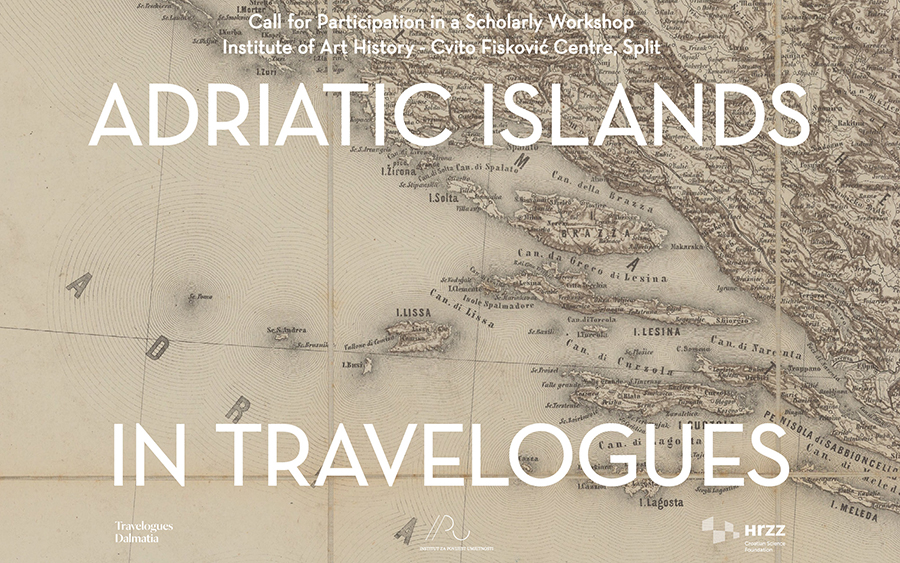The Adriatic Islands in Travelogues
We invite you to participate in the scholarly workshop "The Adriatic Islands in Travelogues", which will take place from May 22 to May 24, 2025, at the Institute of Art History – Cvito Fisković Center in Split (Kružićeva 7). The call is open until March 31, 2025.
The aim of this workshop is to reassess the role played by the islands in the artistic and urban history, and historiography, of the Adriatic and Mediterranean region. Islands are significant spaces for the exchange and location of ideas and people, functioning like molecules in a wider system, that contain specific cultural products in art and space. The Adriatic Sea hosts more than 1.300 islands and islets, predominantly along its eastern shores, with Croatia accounting for more than 1.200, including 50 that are permanently inhabited. Our focus in this workshop are those islands of the region whose important roles at various historical periods have been recorded through artistic or urban production. Simultaneously networked and contained, these islands are key historical fixed or transitory points in the Adriatic Sea, functioning variously as colonies, cities, and harbours. Historically, these islands have attracted travelers of diverse profiles, leaving a rich and varied record of their political and cultural significance.
The artistic and urban history of the Adriatic has been studied in detail with reference to the mainland, but only a few projects have focused primarily on maritime routes as cultural infrastructure, and the islands. The islands – as a separate phenomenon within the overall system of cultural production in the Adriatic region – have yet to become a significant focus of scholarly research.
Research into the art, architecture, and urbanism of the Adriatic through travelogues and intercultural exchanges poses islands as distinctive phenomena that deserve to be the focus of a separate study. Islands have played a key role in the history of Europe and the Mediterranean – as colonies, launching points, sites of secret meetings, and the location of forced or self-imposed exile. These various roles have influenced a distinctive insular history of exceptional artistic production and spatial organization developing under the influence of mixed cultures and physical surroundings.
Island public spaces, shaped by marked spatial limitations, exceptional durability of form, and close community ties, represent particularly significant examples of public space formation. In addition, the isolated nature of islands renders each of them a highly-specific system within which external cultural influences have developed uniquely. Islands are inherently linked to and by the concept of travel. To begin to understand and conceptualise the distinctive phenomenology of the Adriatic islands, we turn to the records of those travelers who, throughout history, visited the islands and engaged in creative dialogue with them, often within a Mediterranean context.
This workshop aims to provide a platform for the systematic exploration and evaluation of the Adriatic islands as unique focal points of artistic and urban achievements across a broad historical timeline. Reflections on the artistic and spatial heritage of the Adriatic islands through travel narratives in various media, with an emphasis on the period from the seventeenth to the mid twentieth centuries form the central, but not exclusive, research focus of this workshop.
We invite contributions from researchers working on the following topics:
- Travelers and travelogues: Exploring the perception of islands through the eyes of “others,” as documented in words and images.
- Artistic heritage: Examining the artistic legacy of Adriatic islands and historical public spaces within transcultural exchanges and the Mediterranean context.
- Digital humanities: Investigating the genesis and classification of island public spaces through advanced tools in digital humanities.
- Urban culture: Analyzing the unique spatiotemporal continuum of island public spaces.
By contributing to the fields of cultural history, art, and urbanism, the workshop aims to position the Adriatic islands as a distinctive repository of the art and cultural spaces of the Adriatic and Mediterranean. We propose the islands equally as significant as mainland cities and maritime routes, and foreground the indispensable role of travelogues as a source for such research.
The workshop will take place at the Institute of Art History – Cvito Fisković Center in Split. The organizers will provide meals during the workshop but will not cover travel or accommodation costs. However, they can assist participants in finding reasonably priced accommodation in the historic city center.
We invite professionals of various backgrounds, whose research addresses these topics to send a 250-word abstract and a short CV to: discoveringdalmatia@gmail.com. Papers and discussion will be conducted in English.
The workshop is developed as part of the Institute’s project TraveloguesDalmatia (HRZZ-IP-2022-10-8676), funded by the Croatian Science Foundation, led by Ana Šverko.
Scientific Committee:
- Joško Belamarić (Institute of Art History – Cvito Fisković Center in Split)
- Mateo Bratanić (Department of History, University of Zadar)
- Jesse Howell (The Center for Middle Eastern Studies, Harvard University)
- Katrina O’Loughlin (Brunel University London)
- Mirko Sardelić (Department of Historical Sciences, Institute for Historical and Social Sciences, Croatian Academy of Sciences and Arts)
- Ana Šverko (Institute of Art History – Cvito Fisković Center in Split)
Organizing Committee:
- Joško Belamarić (Institute of Art History – Cvito Fisković Center in Split)
- Tomislav Bosnić (Institute of Art History – Cvito Fisković Center in Split)
- Mateo Bratanić (Department of History, University of Zadar)
- Ana Ćurić (Institute of Art History)
- Jesse Howell (The Center for Middle Eastern Studies, Harvard University)
- Katrina O’Loughlin (Brunel University London)
- Mirko Sardelić (Department of Historical Sciences, Institute for Historical and Social Sciences, Croatian Academy of Sciences and Arts)
- Ana Šverko (Institute of Art History – Cvito Fisković Center in Split)
#TraveloguesDalmatia #HRZZ
